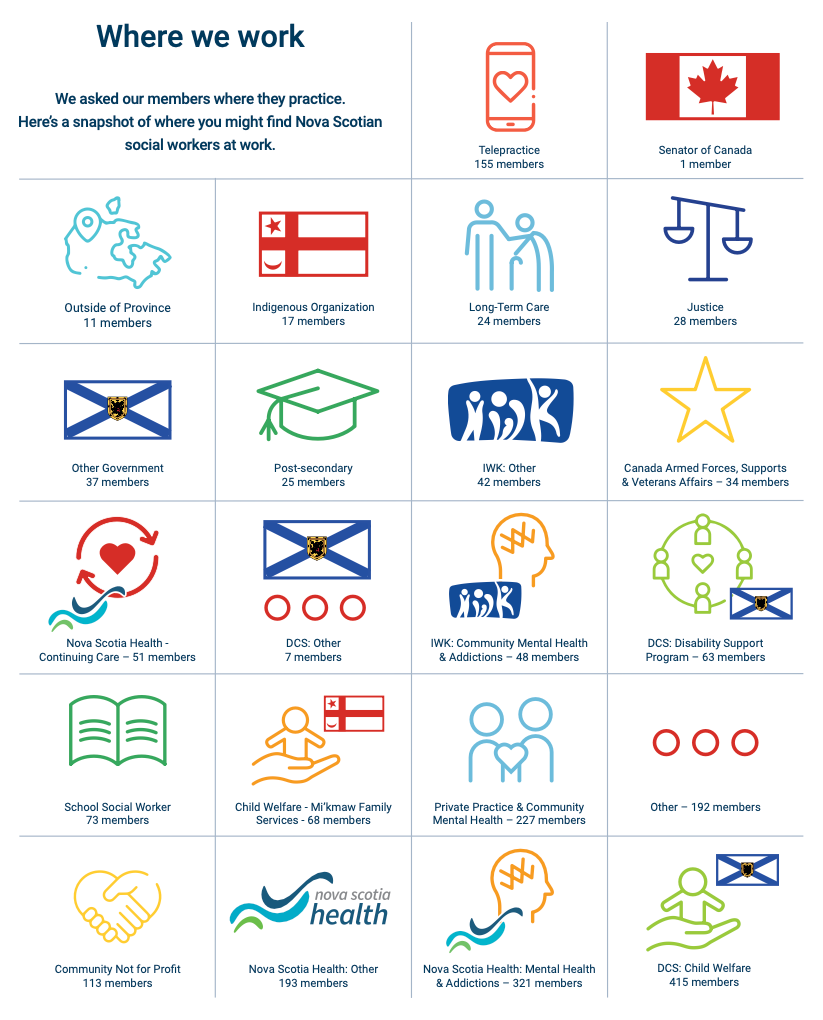
3 minute read
Spotlight on our membership
Workforce analysis
The Nova Scotia College of Social Workers is dedicated to working with the government and the not-for-profit sector to focus on changing our work environment to ensure recruitment and retention strategies are successful.
The data on the social work workforce in our province has revealed a clear trend: more and more social workers are leaving their traditional posts to pursue private practice (indicated by upward trend in private practice registrants and downward trend in RSW registrants), while those who remain in public service are taking longer periods of leave (indicated by associate class).
Given that 85% of social workers identify as women, and the age range is trending younger, it is important that workforce recruitment and retention strategies redesign the work world to be geared to the working caregiver. As working caregivers continue to shoulder the majority of childcare and home labour responsibilities, it’s important to recognize the burnout and inequity they face.
Evidence has pointed to a number of core policy changes that would include ensuring caregivers have control over their schedules, especially those who are working mothers. Offering flexible schedules is a great way to support caregivers who juggle their careers and families. On top of that, providing childcare options such as free on-site care gives caregivers peace of mind while at work.
Paid leave for illness or caregiving is an essential benefit that every employee deserves. Encouraging men to take paternity leave not only promotes gender equality but also reduces any bias against women taking leave. By advocating publicly for caregivers and implementing parent-friendly policies, organizations can promote gender equality and show their support for working mothers, fathers and guardians.
It’s time to eliminate any anti-caregiver bias and focus on the work done instead of the time spent in the office. A strong re-entry approach, including mentoring and “returnships,” can make caregivers feel more secure about returning to work after a caregiving period.
The mental health of caregivers should also be prioritized, because it’s not easy balancing work and family; employers should consider workloads, time away, and mental well-being supports.
While solutions such as affordable childcare and support for fathers taking parental leave are known and are receiving some political attention, the lack of political and individual attention around the specific value and policy change required often intensifies the problem that caregivers face in the work world. It’s time to prioritize the needs of working caregivers and take action towards a more equitable future for all families.

Social workers by region

Halifax 51.66%, Cape Breton 14.29%, Annapolis 7.5%, North Shore 5.7%, Colchester 5.27%, South Shore 3.4%, Fundy Shore 3.4%, Cumberland 2.2%, Out of Province 6.58%
Age of social workers
15% Boomers, 24% Gen X, 49% Millennial, 2% Gen Z
New international applications by country

New applications by province*

* excluding telepractice-only registrants with primary registration in another Canadian jurisdiction
Social workers by designation
377 Private Practitioners
1,344 Registered Social Workers
155 Registered Social Workers (Telepractice)
450 Social Worker Candidates
119 Associates
40 Retired Associates
167 Students
2,652 Total









